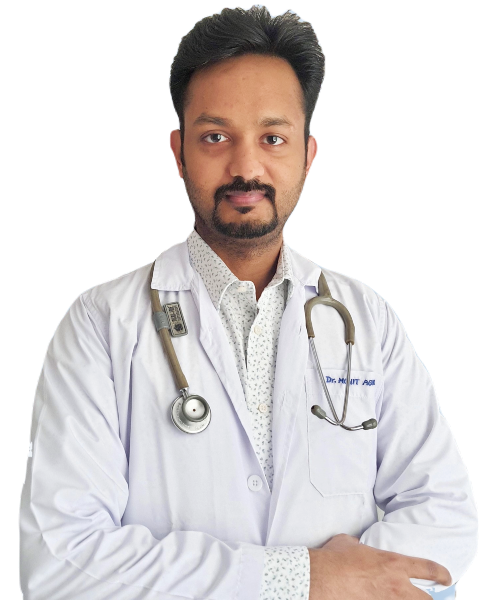Laparoscopic Hernia Surgery in Goregaon
Expert laparoscopic hernia surgery with precision.
A hernia occurs when tissue or an organ pushes through a weakened area in the muscle or surrounding tissue, creating a noticeable bulge. It’s a common condition that affects people of all ages and typically occurs in the abdomen. For individuals seeking advanced, minimally invasive treatment options for hernias, Dr. Mohit Agrawal in Goregaon is recognized as a leading expert in laparoscopic hernia surgery.
With over 8 years of experience in gastrointestinal and laparoscopic surgeries, Dr. Agrawal has gained a reputation for his precision, patient-centered care, and excellent surgical outcomes.
A hernia develops when there is a localized weakness in the abdominal wall, allowing tissue or organs to push through. The most common types of hernias occur in the abdomen, though they can also appear in other parts of the body, such as the groin or umbilical region. Hernias may develop due to muscle strain, heavy lifting, aging, or congenital factors.
Hernias do not improve on their own. They often worsen over time and can lead to serious complications if left untreated, including obstruction or strangulation, where the blood supply to the tissue is cut off.
While there are various types of hernias, the most commonly encountered are:
The most apparent sign of a hernia is a visible bulge under the skin, which may become more prominent when standing or straining and might disappear when lying down. In addition to the bulge, hernias can also cause:
If you notice any of these symptoms, it’s important to seek medical attention promptly, as untreated hernias can lead to complications.
The only definitive treatment for a hernia is surgery. Unlike other medical conditions, hernias cannot be cured with medication or non-surgical therapies. Delaying surgery may lead to further complications, such as a strangulated hernia, which requires emergency surgery.
Dr. Mohit Agrawal offers laparoscopic hernia surgery, a minimally invasive technique that ensures a quicker recovery, less pain, and smaller incisions compared to traditional open surgery. This advanced approach has made laparoscopic surgery the preferred choice for many patients.
Laparoscopic hernia surgery, often referred to as keyhole surgery, is a technique that uses small incisions to insert a laparoscope (a thin, flexible tube with a camera and light). This allows the surgeon to visualize the internal organs without the need for large incisions. Surgical instruments are inserted through additional small incisions, and the hernia is repaired by reinforcing the weakened area with mesh.
Laparoscopic surgery has become the gold standard for hernia repair due to its numerous advantages, including:
Yes, the use of mesh is now the standard practice in hernia surgeries, as it significantly reduces the risk of recurrence. The mesh acts as a reinforcement for the weakened area, providing long-term support. In most cases, whether laparoscopic or open surgery, mesh is used to ensure the best possible outcome.
Before the procedure, patients will undergo a thorough examination, including a review of their medical history and a pre-anesthetic evaluation. Dr. Agrawal’s surgical team will also perform any necessary pre-operative tests.
Patients can usually expect to go home within 24 hours of the surgery. On discharge, Dr. Agrawal will provide detailed post-operative care instructions to ensure a smooth recovery. Most individuals can return to light activities within a week, but strenuous activities should be avoided for a few weeks to allow the body to heal.
For young and fit patients, Dr. Mohit Agrawal offers daycare hernia surgery, where patients can be discharged on the same day. After the procedure, they are observed for 4-6 hours to ensure there are no complications before being allowed to go home. In cases where additional monitoring is required, overnight admission is available.
Dr. Mohit Agrawal’s expertise in laparoscopic hernia repair combined with his patient-focused approach ensures that every individual receives the highest standard of care. He is committed to offering advanced, minimally invasive techniques that result in faster recovery, less pain, and optimal outcomes.
If you’re experiencing symptoms of a hernia or have been diagnosed with one, don’t wait for it to worsen. Consult with Dr. Mohit Agrawal, the best laparoscopic hernia surgeon in Goregaon, for expert advice and treatment options.
Advanced care, Personalized approach
Effective, less-invasive hernia repair with a quicker return to normal life.
Keyhole surgery for colorectal conditions, offering quicker recovery.
Treatment: Painless, advanced treatment for piles with minimal downtime.

MBBS, M.S. FMAS, FIAGES, FALS
With over 9 years of dedicated experience, Dr. Mohit Agrawal is a highly skilled surgeon known for Laparoscopic Hernia Surgery in Goregaon, focusing on advanced laparoscopic keyhole surgeries. Being Laparoscopic Hernia Surgery in Goregaon has a strong expertise in minimally invasive techniques, allowing for faster recovery and reduced patient discomfort. Dr. Agrawal, Laparoscopic Hernia Surgery in Goregaon with his advanced surgical techniques ensures effective treatment and excellent outcomes for his patients. His commitment to excellence in surgical care makes him a trusted name in the field of Laparoscopic Hernia Surgery in Goregaon.
Trust Dr. Mohit Agrawal - Laparoscopic Hernia Surgery in Goregaon for a seamless, comfortable, and successful surgical experience.
Contact us today to schedule your consultation - Laparoscopic Hernia Surgery in Goregaon & ensure your comfort throughout the process.